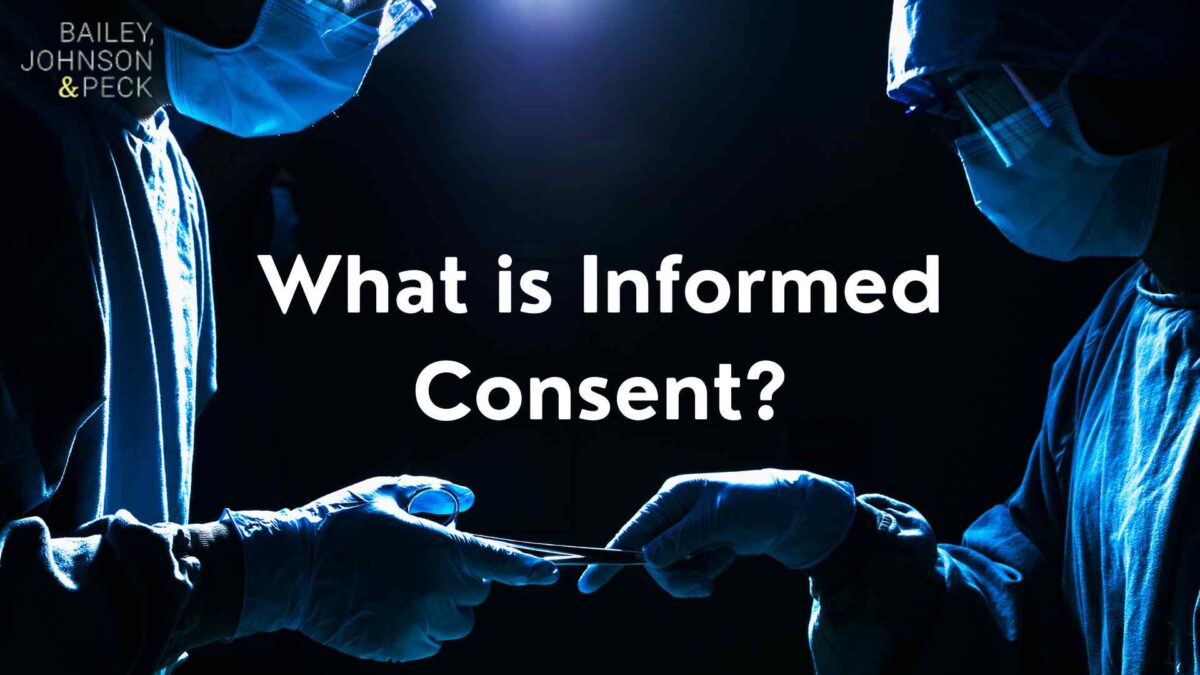What is Informed Consent?
In medical ethics, one principle stands above the rest regarding patient protection and accountability: informed consent. At Bailey, Johnson, & Peck, we recognize the critical role that informed consent plays during a patient’s medical care.
Informed consent is a fundamental agreement between a patient and their healthcare provider. It represents the patient’s right to be fully informed about their medical treatment, including the risks and benefits, before deciding. Healthcare providers who fail to follow the informed consent process have committed medical negligence.
The issue of informed consent takes center stage in cases where patients may have suffered harm due to inadequate information or violations of their rights. In this blog, our Albany medical malpractice attorneys will explain the importance of informed consent laws and the legal recourse available to anyone who has suffered injuries because of a lack of informed consent.
If a negligent healthcare provider fails to follow the informed consent process, which results in catastrophic injuries or wrongful death, you have the right to pursue legal action. Contact the compassionate medical malpractice attorneys at Bailey, Johnson, & Peck today by calling 518-456-0082 to learn more about your legal options.
Informed Consent Definition
Informed consent is an ethical and legal obligation of healthcare providers that involves a patient’s voluntary and informed agreement to undergo a medical treatment or procedure. This informed permission process ensures that patients are active participants in their healthcare decisions. It empowers patients to make choices based on their values, preferences, and understanding of the medical situation. Informed consent also serves to protect patients’ rights and promote transparency in healthcare.
The informed consent process acts as a two-way street. Healthcare providers must clearly explain the medical treatment or research procedure to their patients, and patients should be able to ask questions regarding their medical care.
If a patient fears the risks related to the procedure, informed consent allows them to refuse treatment. For example, suppose there’s a possibility that a patient could lose eyesight due to their medical procedure. In that case, they should understand that risk based on the information provided by their doctor or health care team and be able to make an informed decision to either move forward or forgo the procedure.
Failure to obtain consent, or obtaining informed consent improperly, can have legal and ethical consequences for healthcare providers, particularly in cases where patients allege that they were not adequately informed about the risks and alternatives associated with a medical procedure.
Why is Informed Consent Important?
Informed consent represents the cornerstone of patient-centered care, ensuring that individuals have the autonomy to make an informed decision about their medical treatment. The significance of obtaining consent cannot be overstated, as informed consent not only upholds the principles of transparency and respect for a medical practice but also serves as a protective shield for both patients and healthcare providers.
Medical Ethics and Informed Consent Laws
Why must medical professionals obtain informed consent?
During medical procedures, patients often experience a sense of vulnerability as they have limited control over what is happening to their bodies. Many medical treatments and procedures involve close examination by healthcare providers, which can sometimes feel like an invasion of privacy. However, informed consent is crucial in preserving patient autonomy. It lets patients maintain their dignity and assert control over what transpires during medical procedures, thus empowering them in the decision-making process related to their own bodies.
Many patients don’t understand medical terminology or the intricate workings of the human body, so doctors should communicate in a way that is easily understandable. When healthcare providers use the same technical language with patients as they do with their colleagues, patients may not realize what they’re consenting to or have a clear understanding of other testing and treatment options.
The patient’s ability to understand the procedure or alternative treatments available is a key point for legally-mandated informed consent.
Consider decision-making in other contexts; when making significant choices, you always want as much information as possible before making a decision. For instance, when buying a home, you want details about the property you’re interested in and knowledge of other available houses to explore all your options. Similarly, patients require comprehensive information about potential treatments and alternative treatments before they provide consent. This is why informed consent requires healthcare providers to explain treatments and associated risks. It empowers patients to make well-informed decisions about their healthcare.
Informed consent plays a significant role in reducing legal liability for every medical practice, which is why many opt for a signed form or informed consent document. Informed consent documents are a legal record proving that the patient was was involved in the decision-making process,they understood the risks and benefits, and they voluntarily agreed to the treatment.
Medical consent forms serve as a protective measure for both healthcare providers and patients by ensuring that patients make informed decisions about their medical care. This importance is why, in many cases, valid informed consent involves signing procedure-specific forms.
Informed consent is critical to building trust between healthcare providers and patients. It promotes transparency, respect for patient autonomy, open communication, patient-centered care, medical ethics, and shared decision-making. Trust is fostered when patients feel informed, respected, and included in their healthcare decisions through the informed consent process.
Informed Consent Process Checklist
Obtaining consent is more than a discussion between a healthcare provider and their patient. There’s a strict process that must be adhered to to meet all the requirements, outlined by the Institutional Review Board.
The informed consent discussion includes a clear explanation of the medical procedure or treatment, details of the risks and side effects caused by the procedure, whether this is a minimal risk or not, other options and alternative treatments available, the risks if they refuse treatment, and an evaluation of the patient’s ability to understanding of what was discussed.
Explaining The Nature of The Medical Treatment or Research Procedures
Informed consent requires patients to understand the medical procedures, interventions, or therapies they will undergo. This communication is essential to ensure patients know what to expect during their treatment, including its purpose, risks and benefits, and expected outcomes. It is a critical step regarding informed consent and contributes to patient autonomy and trust in healthcare decisions.
For research participants, informed consent requires research subjects to understand the scope of the research project, including the purpose, risks and benefits, and potential outcomes.
Explaining the Risks and Benefits of the Procedure
As part of informed consent, healthcare providers should clearly explain the risks and benefits of their patients’ medical treatments. Understanding the potential outcomes and risks allows them to make informed decisions about their medical care.
Explaining Reasonable Alternative Treatments
Before receiving medical treatment or undergoing a procedure, patients should understand that they have choices other than those recommended by their doctor. This communication ensures that patients are aware of different approaches to address their health issues, allowing them to make informed choices.
Explaining What Happens If the Patient Refuses the Procedure
Another critical part of informed consent is patients’ right to refuse treatment. However, their doctor should explain the dangers of refusing the recommended treatment and how it could affect their overall health.
Assessing a Patient’s Understanding of the Prospective Subject
Once the patient has been told about the nature of their procedure, the risks and benefits, and the alternative treatment options, the healthcare provider must evaluate their understanding of the informed consent discussion. At this point, the patient may ask questions to understand the procedure better.
If the patient provides consent, they will be required to sign a written consent form or provide verbal consent, depending on their state’s informed consent laws.

Which Medical Procedures Require the Physician to Obtain Informed Consent?
Informed consent is generally required for medical procedures that involve treatment, surgery, interventions, or therapies that pose risks to the patient. However, the informed consent process may differ depending on the type of treatment.
Listed below are the common examples of medical procedures that require informed consent:
Anesthesia;
Any time a person’s personal information is transferred;
Any type of surgical procedure;
Biopsies;
Blood transfusions;
Cancer treatments, including chemotherapy and radiation;
A clinical trial that involves human research subjects, including psychological research;
Clinical trials and research that medical students participate in;
Genetic tests;
Labor and delivery interventions;
Medical implants;
Medical testing that involves a camera going into a body, i.e. colonoscopies;
Treatments that involve high-risk and possibly addictive medications, like opioids;
Vaccinations;
Vaginal birth following a c-section (VBAC).
Can You Withdraw Consent?
Yes, patients can withdraw their informed consent at any time, regardless if the treatment is high risk or minimal risk. Even if the patient has signed the necessary consent forms, they can still withdraw informed consent. At this time, the doctor or healthcare provider must respect the patient’s decision and refrain from any form of pressure or coercion.
As soon as a patient wishes to withdraw the consent, they should make it known immediately. This will allow the medical staff to make adjustments to their treatment plans.
When a patient withdraws consent, they should not be met with any backlash or face negative consequences from this decision. The ability to withdraw informed consent is an important aspect of the informed consent doctrine and further promotes patient autonomy.
Following the withdrawal of consent, it must be documented in the patient’s medical records with either a verbal or signed consent form.
Exceptions to Obtaining Informed Consent
While obtaining informed consent is a fundamental practice in healthcare, some exceptions and situations may not be feasible or necessary. The most common exceptions to informed consent are emergency medical situations, incapacitation, and minors.
Patient Cannot Make a Voluntary Decision
When a patient lacks medical decision-making capacity, either due to a mental illness or suffering a medical emergency, healthcare providers may continue treating them without a signed consent form if that patient is at serious risk of harm or death. Under these circumstances, a medical “surrogate” will be chosen to make medical decisions on the patient’s behalf. This surrogate is typically a spouse or family member.
Implied Consent: Immediate Intervention is Needed
In life-threatening or urgent medical situations where immediate treatment is required to prevent harm or save a patient’s life, obtaining consent may not be possible. Healthcare providers or those operating in an emergency department, in many cases are authorized to provide treatment without the patient’s consent in such cases.
The only exception to informed consent regarding emergencies is if the patient has a DNR. Under these circumstances, implthe medical team must honor the patient’s wishes.
Children Require Parental Permission
As the law currently stands, informed consent applies to adults only. Under informed consent laws, children and minors lack the mental decision-making capacity required to provide informed consent. To treat the child, the healthcare provider must obtain consent from their parent or guardian.
In some states, there are “mature minor” exceptions that allow minors of a certain age or who are mature for their age the ability to make their own medical decisions without the involvement of parents, guardians, or family members.
This is not the same as “medical emancipation,” which lets minors exclude their parents and guardians from being involved in their medical treatments. Under these circumstances, the state may assign a medical surrogate to assist them in decision-making medical decisions. Such consent is a common scenario in cases involving neglect or abuse.
Is Lack of Informed Consent a Form of Medical Malpractice?
Lack of informed consent can be considered a form of medical malpractice. Informed consent is a critical aspect of the standard of care in healthcare. When a healthcare provider fails to provide details surrounding their treatment, risks, alternatives, etc. and continues with the procedure, they’ve committed medical malpractice.
Healthcare providers have a legal and ethical obligation to obtain consent from patients, and failure to do so can lead to legal liability if it harms the patient. Patients have the right to be informed about their healthcare, as decision making hinges on them having complete and accurate information.
Can You Sue a Health Care Provider for Lack of Informed Consent?
Yes, you can sue a healthcare provider for lack of informed consent if you believe that the provider failed to adequately inform you about a procedure, treatment, or intervention, and this lack of information resulted in harm or adverse outcomes. For an injury claim regarding lack of informed consent, your Albany medical malpractice attorney will collect evidence to establish the four elements of negligence that occurred: duty of care, breached duty of care, causation, and damages.
Duty of Care: Healthcare providers are legally obligated to inform their patients about the risks and benefits of a treatment or procedure.
Breached Duty of Care: When a medical professional fails to provide information about the risks, benefits, and alternatives of the procedure or treatment, they’ve acted negligently.
Causation: The patient was harmed as a direct result of not being properly informed. In other words, had the patient been adequately informed, they might have made a different decision that could have prevented harm.
Damages: The patient experienced quantifiable damages, such as physical or emotional harm, as a result of the lack of informed consent.
Medical malpractice claims regarding informed consent are some of the most complex Albany personal injury cases and require extensive knowledge and experience. At Bailey, Johnson, & Peck, you can trust that your medical malpractice attorney will do everything possible to ensure your rights are protected and the responsible party is held accountable.
Medical Malpractice Damages As a Result of Lack of Informed Consent
A medical malpractice case can result in financial compensation to cover damages the victim suffered due to lack of valid informed consent. These damages include various expenses, including medical bills, pain and suffering, lost income, and rehabilitation costs. Economic damages cover quantifiable losses, such as medical bills and lost wages, while non-economic damages address intangible harms like pain, emotional distress, and loss of quality of life.
Compensatory Damages for Lack of Medical Consent
Compensatory damages are monetary awards intended to compensate the injured patient for the losses and harm caused by the healthcare provider’s negligence. These damages aim to “compensate” the patient for economic and non-economic losses.
Economic Damages: Examples include medical expenses (past and future), lost wages or income, and rehabilitation costs.
Non-Economic Damages: Examples include emotional distress, pain and suffering, loss of consortium, and diminished quality of life.
Punitive Damages for Lack of Medical Consent
Punitive damages are monetary awards in medical malpractice cases that punish healthcare providers for extreme misconduct. Unlike compensatory damages that cover losses, punitive damages aim to deter future wrongdoing. They are awarded when a healthcare provider’s actions show deliberate disregard, recklessness, or malicious intent toward the patient’s safety. The court determines the amount, and some jurisdictions have limits on punitive damages.
Call Albany Medical Malpractice Attorneys at Bailey, Johnson & Peck Today
The attorneys at Bailey, Johnson & Peck are here to advocate for your rights and help you navigate the complexities of your medical malpractice case. With their expertise and commitment to holding healthcare providers accountable, you can trust that your lawsuit will be in capable hands. Don’t delay in seeking the legal support you deserve. Contact Bailey, Johnson & Peck today by calling 518-456-0082.




